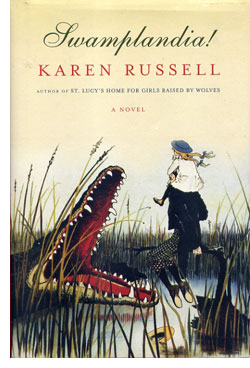 |
 |

Karen Russell
Swamplandia!
Reviewed by: Rick Kleffel © 2013
Alfred A. Knopf / Random House
US Hardcover First Edition
ISBN 978-0-307-26399-5
Publication Date: 02-01-2011
326 Pages; $24.95
Date Reviewed: 02-26-2013
Index:
General Fiction
Fantasy
Editor's Note:
Here's a perfect example of why reading is so rewarding. Books come out at a pace so relentless that you can read full-time and more and still manage to miss a Pulitzer Prize finalist that is truly, deeply weird. In case you have been in your own swamp, hardcover first editions of this book are still reasonable, at least from Ziesings. Hesitate at your own peril.
We're not going to see the end of our own story. We'll be dead. The best we can hope for is to see the slow unraveling that precedes the end, to be aware of the decline and manage a grim joke or a stern smile beforehand. Perhaps we'll be able to inspire those who follow with a funny story from our lives, and amuse ourselves as well. Being weird helps in this regard. American oddballs are a hardy clan. What's one more boot when you're used to getting kicked around?
Karen Russell's 'Swamplandia!' is a peculiar, powerful portrait of the American oddball. Russell's intense prose lens likes to focus the burning sunlight of Florida on her human ants, the Bigtree family, until they start to smoke. The story begins after an ending — Hilola Bigtree, the gator-wrestling wife and mother, falls victim to cancer. She leaves behind her husband, The Chief, her son, Kiwi, her oldest daughter, Osceola and her youngest daughter, Ava. The Bigtrees have lived and raised their children in their home-grown theme park, Swamplandia! — forever, so far as Ava is concerned. But without Hilola, the balance is tipped and the center does not hold.
Russell's novel runs on an engine of hot prose that captures the reader in the minutia of low-down life on the actual edge of the American Dream. She runs it hot and cold. We get drop-dead gorgeous description of the Florida swamps, from exotic plants to rotting trash heaps, in sentences that evoke a slow apocalypse. Her sophisticated grammar and exotic vocabulary are a joy to read. Then, she throws in a sentence that is so funny, such a great joke, that you want to read it three or four times just to make yourself laugh again — and you will laugh again. It's a tremendous treat to wade into Russell's weird universe.
The characters we meet are every bit as strange as they need to be, and that is plenty strange enough. We spend the most time with Ava and Kiwi, and they are both great guides to a place that is not so nice to visit and definitely not somewhere you'd want to live. Ava is our main mooring, and she's quickly unmoored. She's smart but not precocious and we learn a lot from her observations of things we know but she does not.
Ava tells her story in the first person, and as a reader, you'll have the feeling that she is sitting in the room with you, spinning her yarns and presenting them with an authority that she does not actually possess. Kiwi is almost precocious, but so unworldly as to overpower any advantage his intellect might be inclined to bestow upon him. The Chief managed to get where he is pretty much without ever having to mature, while Osceola has stepped off into a girly adolescent otherworld. They're a pretty standard American family, taken out to the edges of the acceoptable and left to fester with Hilola.
Russell's plot has everyone leaving Ava behind, for the best of all possible reasons. This is America, after all. We only abandon our children and siblings with the best of intentions, usually economic. While waiting for their return, Ava is visited by a traveling fixit-guy who calls himself The Birdman. Before you can say Southern Gothic, Ava is on a journey to the Otherworld. Of course, in the U S of A, our Otherworlds tend to be a bit on the ratty and run-down side of the equation. As Ava wanders, Kiwi embarks on a more common quest. He takes a job for a competitor on the mainland in order to help bring the family closer to solvency. Like many an American father, the Chief up and disappears.
Russell's vision of life on the rotting edges of our collective conscious is richly textured, often laugh-out-loud funny, and ultimately, as odd and unresolved as we are. While so much American literature and so much of the American consciousness is concerned with the Apocalypse, after which there is nothing, or nothing recognizable from before, Russell hones in on the sort of ending after which you can still quite easily see and remember the good times that came before. The happy past is still palpable to everyone who once called Swamplandia! a home. The unhappy present seems much more likely to breed bad as opposed to good.
Reading 'Swamplandia!' one feels the power of Russell's prose set to service the awful averageness of our declining standard of living. Our lives are all going to hell. A too-large number of otherwise nice people are actually already working in hell, or they are going to end up there soon. Those who complain about life are often told to consider the alternative. 'Swamplandia!' is a powerful and funny literary afterlife, a testament to the prehistoric pull of the nuclear family in the next world.
|
 |
|
|
 |
| |
Review Archive
All Reviews alphabetized by author.
General Fiction
Non-Genre, general fiction and literature.
Horror
Supernatural fiction, supernatural horror and non-supernatural horror.
Science Fiction
Science fiction, science fantasy, speculative fiction, alternate history.
Fantasy
Fantasy, surrealism and magic realism.
Mystery
Crime, thrillers, mystery, suspense.
Non-Fiction
Non-Fiction, True Crime, Forteana, Reference.
Poetry
|
|
 |
|




